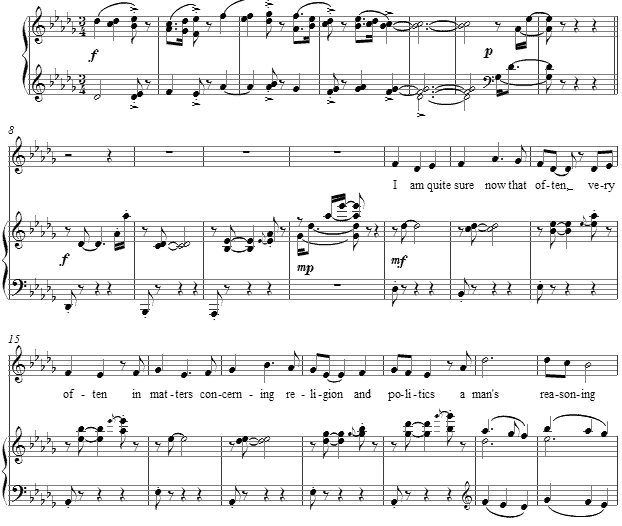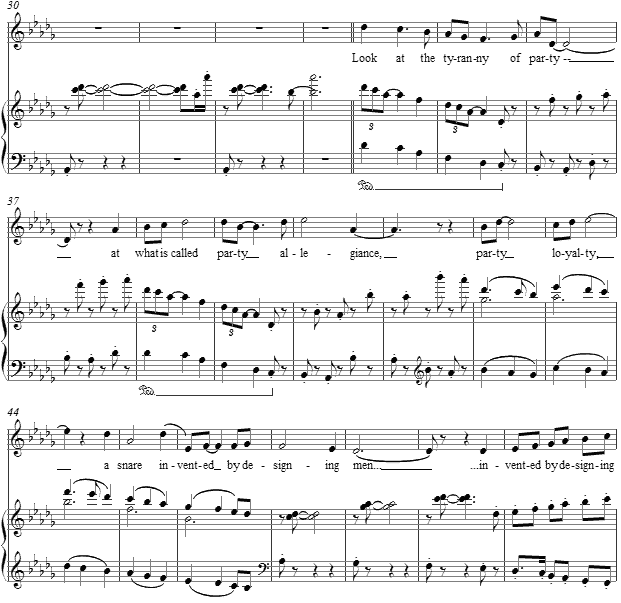Music and Texts of GARY BACHLUND
Vocal Music | Piano | Organ | Chamber Music | Orchestral | Articles and Commentary | Poems and Stories | Miscellany | FAQs
The Tyranny of Party - (2009)
Mark Twain
for medium voice and piano
I am quite sure now that often, very often,
in matters concerning religion and politics
a man's reasoning powers are not above the monkey's.
Look at the tyranny of party --
at what is called party allegiance, party loyalty --
a snare invented by designing men for selfish purposes --
and which turns voters into chattles, slaves, [and] rabbits,
and all the while their masters, and they themselves are shouting rubbish
about liberty, independence, freedom of opinion, freedom of speech,
honestly unconscious of the fantastic contradiction;
and forgetting or ignoring that their fathers
and the churches shouted the same blasphemies
a generation earlier when they were closing their doors against the hunted slave,
beating his handful of humane defenders with Bible texts and billies,
and pocketing the insults and licking the shoes of his Southern master.[ 6 pages, circa 4' 00" ]
Mark Twain
A composite of texts from "The Character of Man," Mark Twain's Autobiography, and another quote popularly known and often cited, this American master of humor skewers politics and specifically political parties.
Twain wrote, "When the doctrine of allegiance to party can utterly up-end a man's moral constitution and make a temporary fool of him besides, what excuse are you going to offer for preaching it, teaching it, extending it, perpetuating it? Shall you say, the best good of the country demands allegiance to party? Shall you also say it demands that a man kick his truth and his conscience into the gutter, and become a mouthing lunatic, besides?"
This skepticism about political allegiance has great reason behind it for the consistency of political corruption which so easily accompanies party politics, and has its American antecedent in George Washington's Farewell Address of 1796 warning about the destructive nature of party allegiance as greater than national allegiance.
The spelling of "chattles" is Twain's, and the addition of the preposition "and" after it is my editing for the purposes of clarity in the text as a song lyric. "Billies" are wooden clubs and more specifically meant to mean police truncheons, as in the American and British usage. When Twain mention's the "Southern master," he references not only the historical fact of slavery but also and specifically the follow-on dominance of a monolithic culture of the political party, in this reference the Democrat party which lingered as dominant party in the south through the era of Lester Maddox and George Wallace during the struggle for desegregation in which the southern Democrats resisted. [ 1 ]
The introduction quotes "My Country, 'Tis of Thee," originally the British national anthem but associated strongly with the United States as well through Smith's Americana lyrics, albeit in slightly twisted rhythm, after which a seemingly normal strophic verse form begins the text.
The seemingly normal song form actually comprises two different verses, the second beginning as at measure 34 below, which reprises as does the "first" verse as above at measure 12, though in inverse order. The second "verse" is accompanied by the tonic major seven chord, and at the text "party loyalty" the texture becomes a three-voiced hymn-like cantabile. A middle bridge between reprises of these "verses" is notated as a written recitative.
The score is available as a free PDF download, though any major commercial performance or recording of the work is prohibited without prior arrangement with the composer. Click on the graphic below for this piano-vocal score.
NOTES
[ 1 ] As irritating as history can be, the fact of Democrat politics was one of discrimination against blacks. Clear evidence can be amusingly seen in Reverend Daniel Webster Davis's poem, "De Nigger's Got to Go," in Idle Moments Containing Emancipation and Other Poems (1895), wherein he reports in black patois with sad humor, "I don' kno' much 'bout politicks, / An' all dem things fur sho', / But de las leckshun I jes vote / Like de white folks tole me to; / Dey tole me vote for Dimikrats / An' 'twould be better sho', / But now dey don de leckshun win / But dey sez we's got to go." Some settings in song of this fine American poet are Hog Meat in dialect and I Can Trust in standard English. Mark Twain observed, " I am a democrat only on principle, not by instinct -- nobody is that. Doubtless some people say they are, but this world is grievously given to lying."
Note that he chose the lower case "democrat" rather than the upper case "Democrat," for his individualist skepticism of parties was profound; it is mine as well, per my earnest poem, I shall not join the party. In this manner, while I can be a democrat and a republican, I resist the arguments to be Democrat or Republican for all such reasons as Twain, Davis and so many other wise men have taught us -- a lesson greatly resented by party members and well worth holding dear.


